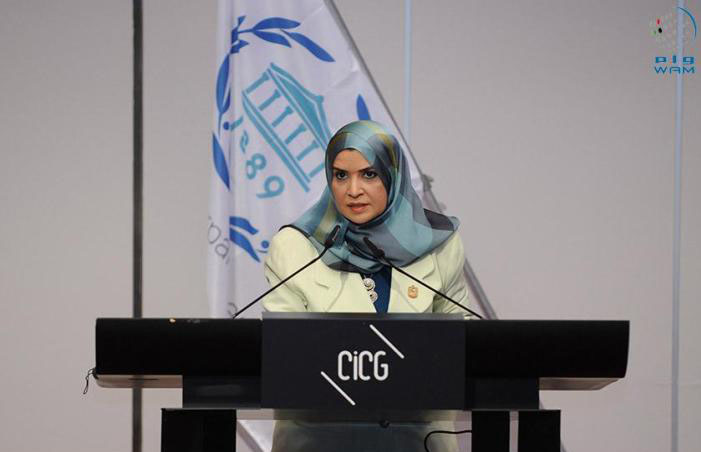ID :
384448
Wed, 10/21/2015 - 09:33
Auther :
Shortlink :
https://www.oananews.org//node/384448
The shortlink copeid
UAE adopts comprehensive and balanced visions in security and stability issues in the Arab region, says Amal Al Qubaisi

GENEVA, 21st October, 2015 (WAM) – Dr. Amal Al Qubaisi, First Deputy Speaker of the Federal National Council (FNC), Head of Inter Parliamentary Union (IPU) Group, has said the UAE embraces comprehensive and balanced visions when it comes to the security and stability issues in the Arab region.
Addressing the 133rd session of IPU General Assembly in Geneva, Dr. Al Qubaisi said that the national security of each state is part and parcel of the joint regional security, and what is unfolding in Yemen today can happen in any Gulf or Arab state.
"Therefore, the UAE and sisterly states cannot keep their fingers crossed while gangs and states backing international terrorism infringe on the sovereignty of a sisterly state," she said.
"Legitimacy is a fundamental principle that has allowed us today to meet here. And we are not willing to turn a blind eye while aggressors are at our threshold," Dr. Al Qubaisi warned, adding, "This is what prompted the UAE and sisterly states to establish the Arab coalition, led by Saudi Arabia to defend the will of the people of Yemen through backing the legitimacy, defending the regional security and truth and justice."
She said that the instability being experienced by Yemen was caused by the group, which has overthrown the legitimate authority with the support of a regional power with a historic record in support of global terrorism, financing it and interference in the internal affairs of other countries.
"This power does not respect international norms and laws out of a sheer belief that it can benefit from the continuity of international silence to extend its influence and interventions in the affairs of the region," she said.
Dr. Al Qubaisi underlined that the position of the UAE and its allies stems from the international legitimacy of the United Nations Security Council Resolution No. 2216, which is the basis for resolving the Yemeni crisis.
"We believe that the resolution would have no value if not backed by action. Therefore, we call upon the UN Security Council members to back their resolutions and ensure their implementation," she added.
Dr. Al Qubaisi called for concerted international action to settle the conflicts and tackle terrorism based on the international principles.
"However, we must all acknowledge that the United Nations has failed to apply the concept of international collective security, as most of its resolutions on Palestine, Yemen, Syria, Iraq, and Libya have been in vain. It is the failure of the permanent members of the UN Security Council," she said.
She emphasised that the fiasco of the United Nations and the Security Council stokes the continuity of the Israeli occupation of Palestine, persistence of war crimes and crimes against humanity in Palestine, Syria and Yemen, as well as the evolution of terrorism from Al Qaeda to Daesh to become the biggest challenge to the global system in all continents of the world, and pose a great threat to international peace and security.
Dr. Al Qubaisi said the nature of current conflicts in the region, whether in Palestine or Yemen or in Syria or Iraq, on part of countries or organisations, has begun to take a serious, sectarian shape.
"What is happening in the region is not in fact a mere sectarian struggle, but a geo-strategic conflict. The sectarian feud gives a specific regional state the ability and access to move in the area it was not traditionally part of its influence," she said.
She noted that the UAE Parliamentary Division has warned about risks of stirring religious and sectarian conflicts, as these could lead to new debilitating conflicts in the region that would spill over into many other regions worldwide. – Emirates News Agency, WAM - http://www.wam.ae/en/news/emirates/1395286936250.html





